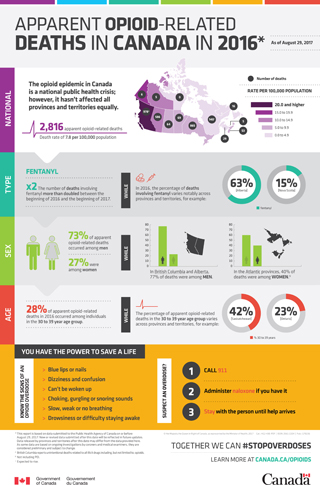Infographic: Apparent opioid-related deaths in Canada in 2016 (August 2017)
Infographic: Apparent opioid-related deaths in Canada 2016Footnote * (August 29, 2017)
The opioid epidemic in Canada is a national public health crisis; however, it hasn't affected all provinces and territories equally.
- 2,816 apparent opioid-related deaths
- Death rate of 7.8 per 100,000 individuals
- Circles indicate number of deaths
- Rate per 100,000 population
| Province/territory | Rate range per 100,000 population in 2016 | Number of deaths |
|---|---|---|
| Alberta | 10.0 to 14.9 | 586 |
| British ColumbiaFootnote a | 20.0 and higher | 978Footnote a |
| New Brunswick | 0 to 4.9 | 29 |
| Newfoundland and Labrador | 0 to 4.9 | 16 |
| Northwest Territories | 10.0 to 14.9 | 5 |
| Nova Scotia | 5.0 to 9.9 | 53 |
| Nunavut | 0 to 4.9 | 0 |
| Ontario | 5.0 to 9.9 | 865 |
| QuebecFootnote + | 0.0 to 4.9 | 140Footnote + |
| Manitoba | 5.0 to 9.9 | 69 |
| Saskatchewan | 5.0 to 9.9 | 64 |
| Prince Edward Island | 0.0 to 4.9 | 5 |
| Yukon | 15.0 to 19.9 | 6 |
Type of Opioid
- FENTANYL
- x2 The number of deaths involving fentanyl more than doubled between the beginning of 2016 and the beginning of 2017.
While
- In 2016, the percentage of deaths involving fentanyl varies notably across provinces and territories, for example:
- 63% Alberta
- 15% Nova Scotia

Download the alternative format
(PDF format, 1.27 MB, 1 pages)
Organization: Health Canada
Type: Infographic
Published: 2017-09-14
Related Topics
Sex
- 73% of apparent opioid-related deaths occurred among men.
- 27% were among women.
While
- In British Columbia and Alberta, 77% of deaths were among MEN.
- In the Atlantic provinces, 40% of deaths were among WOMENFootnote b.
Age
- 28% of apparent opioid-related deaths in 2016 occurred among individuals between the ages of 30 and 39 year age group.
While
- The percentage of apparent opioid-related deaths in the 30 to 39 year age group varies across the provinces and territories, for example:
- 42% Saskatchewan
- 23% Ontario
You have the power to save a life
Know the Signs of an Opioid Overdose
- Blue lips or nails
- Dizziness and confusion
- Can't be woken up
- Choking, gurgling or snoring sounds
- Slow, weak or no breathing
- Drowsiness or difficulty staying awake
Suspect an Overdose?
- Call 911
- Administer naloxone if you have it
- Stay with the person until help arrives
Footer
Together we can #stopoverdoses
Learn more at Canada.ca/opioids
References + Limitations
Footnotes
- Footnote 1
This report is based on data submitted to the Public Health Agency of Canada on or before August 29, 2017. New or revised data submitted after this date will be reflected in future updates. Data released by provinces and territories after this date may differ from the data provided here. As some data are based on ongoing investigations by coroners and medical examiners, they are considered preliminary and subject to change.
- Footnote 2
British Columbia reports unintentional deaths related to all illicit drugs including, but not limited to, opioids.
- Footnote 3
Not including PEI.
- Footnote 4
Expected to rise.